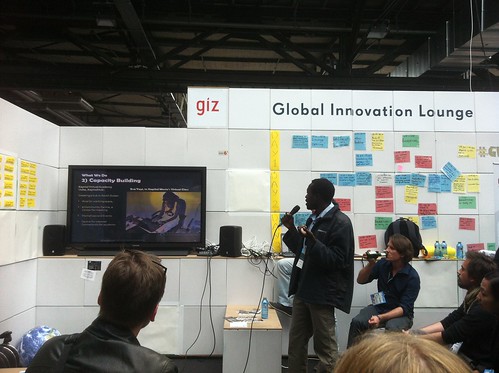Last week, the Open Knowledge community was out in force at Berlin’s re:publica conference, which brought together over 6,000 bloggers, internet activists, innovators and makers to meet in person, for three days. Here, we’ve collected a few of our personal highlights – let us know what yours were in the comments below!
The event was peppered with presentations from members of the Open Knowledge Foundation community. First, OKF Germany’s Stefan Wehmeyer and Julia Kloiber talked on “What does Open Data have to do with me?” (presentation in German). Their beautifully designed presentation looked at how open data could positively impact the everyday lives of citizens, such as through open publication of school inspection results, as happens in the UK, or police forces making data about cycling accidents available, enabling the creation of maps such as this one for Chicago.
The OKF’s OpenGLAM team, Joris Pekel and Daniel Dietrich, gave a talk about the curation of the digital cultural commons., largely inspired by the recent post on OpenGLAM about Small Data in GLAMs. They addressed the issue of effective overload of data – that the vast amount of data available renders it almost incomprehensible. Dealing with this effectively requires better infrastructure, access and tools.
Other OKFn-ers were spotted on the panel on Opening Public Transport in Berlin (Julia Kloiber again – the only woman on an all male panel!), and at the workshop News You Can’t Print (Friedrich Lindenberg), exploring how data informs how we tell news stories.
Over the entire three days, we came across so many new and exciting projects, many of whose objectives go hand-in-hand with the Open Knowledge Foundation’s. Check out Eugenio Tisselli’s Sauti Ya Wakulima project based in Tanzania, for example, which provides a simple platform for farmers from different regions to share insights and advice on how best to grow particular crops. This type of knowledge sharing, open to all and running on an open source platform, is a great example of how the open movement can improve the lives of people across the globe, in many different contexts and positions.
Other highlights included:
- Yoani Sanchez, Cuba’s first independent blogger, talking about the challenges of working in a ‘closed’ environment, both in terms of the overall media environment and in terms of not being able to have access to new hardware such as computer parts or USB sticks. We hope her plea for future visitors to Cuba to take with them any pieces of old hardware and give them to Cuban citizens hit home with other listeners!
-
Laurie Penny’s talk on cybersexism highlighted the gender imbalance within the tech world, an issue which will be explored in forthcoming blogs here at the Open Knowledge Foundation.
-
A presentation from Tactical Technology Collective’s Stephanie Hankey and Marek Tuszynski on “Investigation 2.0” highlighted the results of collaboration across different spheres and of individuals taking on the role of institutions, thanks to new reams of data being made available for all to use.
-
GIZ’s Global Innovation Lounge gave us the chance to mix with representatives from every one of the AfriLabs incubation hubs network, which was a wonderful opportunity to hear how technology and innovation is being fostered in various African countries. Hacker spaces and technology hubs are really taking off, and we hope to see the Open Knowledge community expand within the region too via our Local Groups and Ambassadors scheme.
The complete list of fascinating projects and people we came across is too long to include here, but the fact that there are so many projects working within the open movement is incredibly inspiring to us at the Open Knowledge Foundation. We look forward to collaborating with many of you – do get in touch, tell us about what you’re doing, and let us know how our global OKF Network could help. Or if you’d like to have a look for yourselves what we’re up to – check out our thematic Working Groups or geographically based Local Groups mailing lists, introduce yourselves and get involved in the Open Knowledge Foundation community!
Thanks to Joris Pekel for contributing to this post.
If you’d like to carry on the conversations started at re:publica, join us at OKCon this September!
Zara works with School of Data leading our research and learning, and the 2015 Fellowship Scheme. She is based in Berlin, and can be found tweeting @zararah.










Michael Kreil (OpenDataCity) coded this neat schedule with links to all the available youtube videos: http://michaelkreil.github.io/republicavideos/